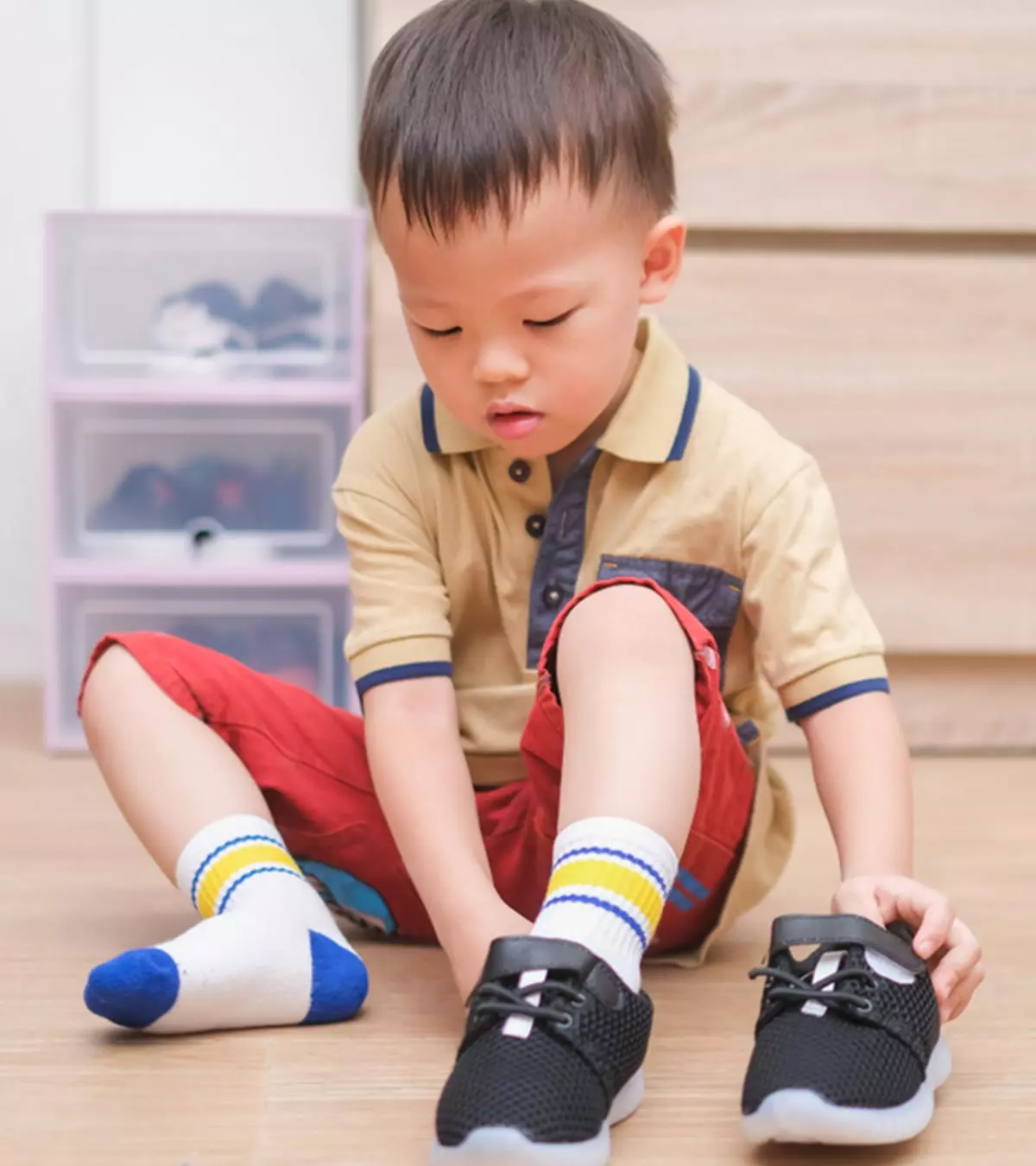
Image: ShutterStock
Teenage is a juncture when children are introduced to tackling life’s challenges. Teenage problems range from academic pressures to social dilemmas and self-esteem issues. With everything hitting at once, a teenager is likely to feel overwhelmed by the demands of the situation and might not know the right way to deal with it. They need a trusted adult who can help them navigate difficult times properly. Your guiding hand can help them tremendously in their tumultuous phase. Share your experiences and essential life lessons so your teens can solve their problems more confidently. Empowering them helps foster resilience and independence and prepares them for the obstacles they will encounter in adulthood. Here are some constructive tips to help your teenager solve their problems.

Key Pointers
- Teens can handle difficult situations better by staying calm and focused on practical solutions.
- Help your teen concentrate on the problem rather than the person or emotion.
- Actively listen to your teen’s problems and assist them in generating and evaluating potential solutions.
- Developing problem-solving skills in childhood helps teenagers become independent, mature, and responsible adults.
7 Common Problems That Teenagers Face
Apart from the stress of excelling in academics, teens face social and personal issues that can impact their emotional and mental well-being. Understanding them can help you provide appropriate support. Here are a few of the most common problems teenagers face.
1. Cyberbullying

Bullying was believed to be limited only to school or college campuses until technological advancement opened doors to a new medium of bullying. Cyberbullying is a serious problem affecting teenagers today. According to research conducted by the Pew Research Center in 2025, around 46 percent of children aged between 13 and 17 years in the US have faced some kind of cyberbullying (1).
2. Social media addiction
Social media is a helpful tool to help connect with friends and family. However, social media addiction can negatively impact adolescents’ school performance and sleep (2). Some social platforms can affect teens’ mental health by engaging them in a competition to get more engagement on their posts. Some children even lead a dual life on social media, obsessed with earning admiration from friends and peers. Some sites also expose teens to discussions on topics inappropriate for their age range. Teens often become addicted to the external validation they get from these sites, which eventually leads to more problems in the future.
Tech writer Prabhu Akash Warnam reflects how social media addiction affected his life. He shares, “As I reflect on my own journey, I realize that what began as innocent curiosity gradually morphed into an insidious addiction that had a profound impact on my life. The constant need to check notifications, the mindless scrolling, and the relentless pursuit of validation took a toll on my mental well-being, productivity, and relationships. It was a wake-up call that led me on a path of self-discovery and liberation from the clutches of social media addiction (i).”
3. Body shaming

The teenage years are a tender period in which children experience several physical changes, including the teenage growth spurt (3). Instead of accepting the natural growth process in life, teens feel pressured to ‘fit in’ the largely known definition of an ideal body to be socially accepted. This is because teens who do not conform to the usual standards of beauty can be fat-shamed, skinny-shamed, or called names for having physical features different than others, which can lead to mental and physical health issues. Appearance comparisons, teasing, criticism, and social exclusion influence adolescent body dissatisfaction (4).
4. Stress
Stress is a part of every teenager’s life. It can be related to academics or their personal lives. So, right from submission of assignments to passing a test or wearing a new outfit every day to school to having maximum likes on a social media profile picture, teens are constantly stressed about simple and complicated problems. If stress is not managed well, it is likely to develop into serious mental problems. Excessive stress in teens can lead to anxiety, aggression, withdrawal, health issues, or succumbing to unhealthy coping mechanisms such as substance use (5).
5. Depression
Depression has been a growing problem among teens in the US. According to the National Institute of Mental Health (NIMH), 13 percent of children aged between 12 and 17 have experienced some form of depression (6). Many factors contribute to depression. It can be due to a poor diet, certain addictions, past trauma, or new age problems, such as FOMO, or Fear Of Missing Out.
6. Drug and alcohol abuse
Drugs and alcohol are some of the most common addictive substances teens choose to experiment with in their rebellious phase. According to a report by the National Center for Drug Abuse Statistics (NCDAS), about 8% of 8th graders might use illicit drugs, and 21.3% would reportedly try them at least once. By 12th grade, the figures suggest that nearly half (46.6%) of teens may have experimented with illicit drugs (7). If the abuse of drugs and alcohol is not controlled in time, it can lead to addiction, which can impact a teenager’s daily life and relationships.
7. Peer-pressure
Teenage is the phase when the need for approval from others can be at its peak. Peer pressure can drastically impact a teenager’s behavior and mind (8). The fear of being a social outcast can make a child take the wrong path. Their quest for popularity can make them do things they would not normally do. Such behavior is likely to lead to anxiety and depression.
Ways To Help Your Teenager Solve Their Problems
Kids may not always want your help when tackling their day-to-day problems. However, you can always guide them so they can independently address their issues. The following steps will help your child solve most teenage problems with ease.
1. Identify the problem

The first step is to teach your child to identify the problem. Ask them about the current situation and how they want it to turn out. Also, encourage them to approach the problem with a positive attitude. Figuring out the real problem isn’t always easy. If people mistake the cause, their attempts to fix it might not work or be a waste of time. For example, if your teen frequently gets into disagreements with siblings or peers, rather than simply blaming them, encourage them to explore the underlying cause, like a misunderstanding or feeling ignored. Help them address it construvtively.
2. Focus
Tell them to focus on the issue, not the person or the emotion. It will help them face the problem bravely rather than suffer from anxiety and frustration. Teach them to stay calm and concentrate on the solution, rather than focusing on who is at fault or how they feel about the situation. For instance, if your teen feels stressed about a group project, guide them to break the project down into smaller tasks instead of getting frustrated with their teammates.
 Quick tip
Quick tip3. Listen

Listening is very critical to developing problem-solving skills. Tell your child to listen without arguing or debating. Encourage them to use statements like ‘I need, I want, I feel’. If your teen is in a disagreement with a you or anyone else, encourage them to understand the power of responding versus reaction. This will help them understand the real issue more clearly.
4. Generate a solution
Sit down with your teenager and encourage them to think about all the possible ways to solve the problem at hand. Ask your child to reflect on their experience during an earlier crisis. Your child may come up with a variety of solutions. Some of them will also be unrealistic. Let them explore their creative abilities. Do not discourage them. For example, if your teen is concerned about their grades, encourage them to brainstorm solutions, such as studying in shorter sessions or seeking help from their teacher. Give them space to explore ideas before deciding on the best approach.
5. Evaluate the solution

Teach your child to evaluate the pros and cons of each of the possible solutions. When parenting teenagers, encourage them to imagine what would happen when they try the solution. Help them omit the options in which the negatives outweigh the positives. It will help your child sort out the most promising solution. For instance, if your teen proposes staying up late to finish homework, talk through the advantages like extra time to work and disadvantages like lack of sleep, which could lead to tiredness and poor focus the next day. This will guide them in making a more ithought-through decision.
 Point to consider
Point to consider6. Put the idea into practice
Now tell your child to implement the idea that can resolve the crisis. Encourage them to give their best and see how it works. Your goal should be to allow your child to solve the problems independently, without much intervention. For example, if your teen creates a study schedule to manage their time better, support them to stick to it and see how it works. They might need to make changes, but it’s important to let them try and adjust as needed.
7. Evaluate the outcome
Lastly, evaluate the outcome of the solution. The solution may take time to work. Keep in mind that at times, you cannot solve all problems in one attempt. So tell them to try all the possible solutions and prepare backup plans. It will also teach your child to not give up easily in life. Then ask your child the following questions:
- What has or hasn’t worked well?
- What can be done differently to make the solution work more smoothly?
For instance, if your teen’s new study routine didn’t improve their grades, ask them what went well and what didn’t. Maybe the study space wasn’t right, or they didn’t follow the schedule regularly. Thinking about this will help them improve their approach.
 Do remember
Do rememberWhy Problem-Solving Skills Are Important For Teenagers
Problem-solving involves analyzing a problematic situation and figuring out ways to solve it in the best way possible. It is a skill that will help teenagers tackle the complex situations they may face in life, and later in adulthood. Developing problem-solving skills can help a teenager,
- Resolve interpersonal conflicts
- Think independently
- Make wise decisions
- Look at situations from different perspectives
- Be open to taking calculated risks
- Develop patience
- Become resourceful and determined
Benefits Of Problem-Solving Skills In Teenagers
Problem-solving skills can play a crucial role in building confidence in teenagers, as they learn to look at problems from different angles. Here are some benefits of developing these skills in a teenager (9) (10) (11) (12).
1. Encourages constructive thinking: Problem-solving skills help teens find constructive solutions to their problems. It will make them empathetic. These abilities are valuable in both social and work situations.
Strengthens empathy and understanding: Problem solving enhances a teen’s ability to understand the positive implications of another person’s intentions and actions.
3. Improves conflict resolution skills: Teens learn to listen actively, think calmly, and respect different opinions, allowing them to navigate disagreements more effectively in both personal and social settings.

4. Fosters independence and responsibility: Since kids are not born with these skills, we need to help develop them. When teens learn to resolve conflicts on their own, they feel more independent, mature, and responsible, enabling them to confidently face bigger challenges life throws at them.
5. Builds confidence: When teens learn to solve problems on their own, they feel more capable and confident in handling real-life situations without constant guidance.
6. Enhances decision making abilities: Problem-solving helps teens assess various options, consider the pros and cons, and make thoughtful choices instead of reacting impulsively.
7. Strengthens social skills and relationships: Effective conflict resolution enables teens to navigate disagreements and arrive at solutions, fostering healthier connections with peers, family, and teachers.
8. Reduces stress and anxiety: Approaching challenges with a clear, structured mindset helps teens manage frustration, stress, and anxiety more effectively.
9. Prepares for future success: Problem-solving equips teens with adaptability and resilience, essential for academic achievement, career growth, and personal development.
Frequently Asked Questions
1. How can teenagers cope with the pressure of social media and bullying?
Teenagers can cope with social media and bullying pressure by setting boundaries, seeking help and support from trusted friends or adults, and practicing self-care. In addition, education and awareness are necessary while using social media.
2. How can teenagers manage their emotions effectively?
Teenagers can manage their emotions effectively by first identifying and acknowledging their emotions. Engaging in activities, such as exercising, meditating, or practicing deep breathing, can help regulate their emotions. It is also helpful when they communicate their feelings with trusted friends or family and seek counseling if needed.
3. How can teenagers deal with feelings of loneliness and isolation?
Teenagers can deal with loneliness and isolation by actively seeking social connections and community resources. They can try joining clubs, support groups, or organizations that align with their interests, volunteering, or participating in group activities. They can also connect with peers online through social media or online forums.
4. How can I help my teens develop problem-solving skills?
Model positive decision-making and discuss with your child how they should approach different challenges. Create a safe space where they can explore solutions and encourage them to express their feelings. This can help you gain insight into the areas they may need to work on and help them develop emotional intelligence.
5. What are some effective communication skills for teenagers to resolve conflicts?
Effective communication skills for teenagers to resolve conflicts include active listening, expressing oneself clearly and respectfully, using “I” statements instead of blaming others, seeking to understand the other person’s perspective, and finding common ground for compromise.
6. How can teenagers learn to prioritize their mental and physical health?
Teenagers can learn to prioritize their mental and physical health by setting goals and following healthy lifestyle habits by creating daily routines that include exercise, healthy eating, and stress-reducing activities. They can also ensure enough sleep and limit their use of electronic devices, as these can negatively affect mental and physical health.
7. How can teenagers handle romantic relationships and breakups?
Romantic relationships and breakups can deeply affect a teenager. To deal with this volatile period, they must try to communicate their feelings with a friend, or preferably, a parent or adult who can listen to them patiently without any judgment. They should be made aware that relationships are not as rosy as shown in movies. They should try to create a new and healthy routine that can help get their mind off any negative feelings and boost their physical and mental well-being.
8. How can teenagers seek help if they are experiencing domestic violence or abuse?
Teenagers facing domestic abuse must inform a trusted adult about it. It can be their close relative, teacher, counselor, therapist, or coach. They can also approach a friend’s parents. In the absence of a trusted adult, teens from the US, US territories, and Canada can call or text the Childhelp Hotline at 1-800-422-4453, where a trained employee will talk to them, or they can visit their website at childhelphotline.org. The lines are open 24/7, so they can contact them whenever needed.
There are various issues that your teenager may face during their adolescent years, including distinct physical and hormonal changes in their bodies, mental condition, and a desire for independence, among others. As parents, you may share some handy tips to solve teenage problems and solutions. But first, allow your teen to try to solve their problem on their own since it will help them build problem-solving skills. You may educate your teen to recognize issues, concentrate and comprehend, look for solutions, and acquire the patience to listen to helpful advice.
Infographic: Steps To Solve Teenage Problems
To effectively solve problems, teenagers need to understand the root cause, develop a plan, and seek support and guidance as needed. This infographic provides a brief overview of strategies to help teens tackle problems independently. Save and share it with your teenager as they learn to navigate challenges and find sensible solutions.
Some thing wrong with infographic shortcode. please verify shortcode syntaxIllustration: Useful Tips To Help Your Teens Solve Their Problems

Image: Stable Diffusion/MomJunction Design Team
Discover an eye-opening video delving into the top 10 challenges faced by teenagers in modern times. Gain insights into these issues, raising awareness about their significance in the modern world.
Personal Experience: Source
MomJunction articles include first-hand experiences to provide you with better insights through real-life narratives. Here are the sources of personal accounts referenced in this article.
i.“Social Media Addiction” in my experience
https://medium.com/@prabhuAkash027/social-media-addiction-in-my-experience-30d81187ce3b
References
- Teens and Cyberbullying 2025.
https://www.pewresearch.org/internet/2025/12/15/teens-and-cyberbullying-2025/ - Social Media Influences To Teenagers
https://www.researchgate.net/publication/342436676_SOCIAL_MEDIA_INFLUENCES_TO_TEENAGERS - The Growing Child: Adolescent 13 to 18 Years
https://www.hopkinsmedicine.org/health/wellness-and-prevention/the-growing-child-adolescent-13-to-18-years - Weight status and body image perceptions in adolescents: current perspectives
https://pmc.ncbi.nlm.nih.gov/articles/PMC4554432/#sec4 - Stress Management and Teens
https://www.aacap.org/AACAP/Families_and_Youth/Facts_for_Families/FFF-Guide/Helping-Teenagers-With-Stress-066.aspx#:~:text=Some%20teens%20become%20overloaded%20with - Major Depression.
https://www.nimh.nih.gov/health/statistics/major-depression - Drug Use Among Youth: Facts & Statistics.
https://drugabusestatistics.org/teen-drug-use/ - Dealing with Peer Pressure
https://www.researchgate.net/publication/332318821_Dealing_with_Peer_Pressure - Problem Solving Ability: Significance for Adolescents
https://www.researchgate.net/publication/327337453_Problem_Solving_Ability_Significance_for_Adolescents - Problem-solving steps: pre-teens and teenagers
https://raisingchildren.net.au/pre-teens/behaviour/encouraging-good-behaviour/problem-solving-steps - How to Help Develop Problem-Solving Skills in Students?
https://articles.unishanoi.org/how-to-help-develop-problem-solving-skills-in-students/ - Problem Solving as an Active Ingredient in Indicated Prevention and Treatment of Youth Depression and Anxiety: An Integrative Review
https://www.sciencedirect.com/science/article/pii/S1054139X22004530#sec4
Community Experiences
Join the conversation and become a part of our nurturing community! Share your stories, experiences, and insights to connect with fellow parents.
Read full bio of Katherine Paxton
Read full bio of Harshita Makvana
Read full bio of Deepa Thomas
Read full bio of Apoorva K
















